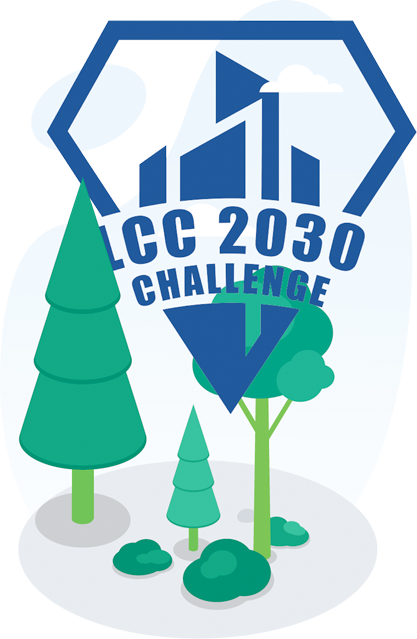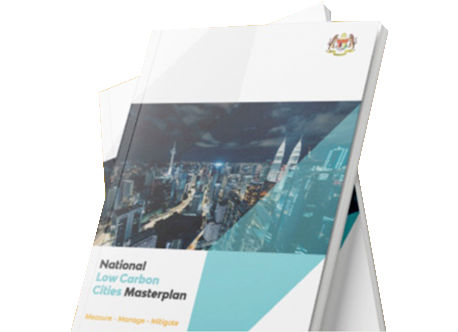LCC 2030 Challenge
Time for a New Normal
Cities around the world are responsible for up to 70% of greenhouse gas emissions globally. With the rapid increase in urbanisation, we have the collective responsibility to ensure sustainability for all. Low Carbon Cities Framework (LCCF) is an initiative by the Malaysian Green Technology and Climate Change Corporation (MGTC) under the Ministry of Natural Resources, Environment and Climate Change (NRECC) to help shift our cities towards a low carbon future.
LCCF was established on 2011 and the objectives of LCCF is to measure GHG emissions of Cities, as a guidance for the Local Authorities to transform their cities into Low Carbon Cities and as a capacity building for the Local Authorities. There are 4 main elements under LCCF which are Urban Environment (UE), Urban Infrastructure (UI), Urban Transport (UT) and Buildings. These main elements was further divided into 15 Performance Criteria and further expanded into a total of 41 sub-criteria.
15 Performance Criteria and its 41 Sub-criteria are listed as below:
A. Urban Environ
1. Site Selection
- 1-1: Development within defined urban footprint
- 1-2: Infill development
- 1-3: Development projects within transit nodes and corridor
- 1-4: Brownfield and Grey field redevelopment
- 1-5: Hill slope development
2. Urban Form
- 2-1: Mixed-use development
- 2-2: Compact development
- 2-3: Road and parking
- 2-4: Comprehensive pedestrian network
- 2-5: Comprehensive cycling network
- 2-6: Urban Heat Island (UHI) effects
3. Urban Greenery & Air Quality
- 3-1: Preserve natural ecology, water body and bio-diversity
- 3-2: Green open space
- 3-3: Number of trees
B. Urban Infrastructure
4. Infrastructure Provision
- 4-1: Land take for infrastructure and utility services
- 4-2: Earthworks management
- 4-3: Urban storm water management
5. Waste
- 5-1: Construction waste management
- 5-2: Industrial waste management
- 5-3: Household solid waste management
6. Energy
- 6-1: Energy consumption
- 6-2: Renewable Energy
- 6-3: Site wide district cooling system
7. Water Management
- 6-1: Efficient Water Management
C. Urban Transportation
8. Reduction Use of Private Motorised Transport on Urban Road
- 8-1: Classified Traffic Volume Urban Road Network
- 8-1: Vehicle-km of Travel by Modes
9. Increase in Public Transport
- 9-1: Public Transport Ridership
- 9-1: Public Transport System Improvement and Coverage
10. Mode Shift from Private to Public Transport and Non-Motorised Transport
- 10-1: Modal Share of Private, Public, and Non-Motorised Transport
11. Use of Low Carbon Transport
- 11-1: Use of More Fuel-Efficient Vehicles for Passenger Vehicles and Green Freight Transport
- 11-1: Number of Charging Stations
12. Improvement to Level of Service of Road Links and Junctions
- 12-1: Performance of Road Links and Junctions
- 12-1: Average Link Speeds and Journey Speeds
13. Utilisation of Transit-Oriented-Development (TOD) Approach
- 13-1: New Development and Redevelopment Schemes Incorporating TOD Concept
- 13-1: Walking and Cycling Facilities to Support Access and Mobility to/from Public Transit Nodes
D. Buildings
14. Low Carbon Building
- 14-1: Active and passive designs
- 14-1: Operational energy consumptions
- 14-1: Operational water consumptions
- 14-1: Preserve existing building stock by retrofitting
15. Community Service
- 15-1: Energy management system
- 15-1: Facility management

Cleaner Cities
A Low Carbon City has cleaner air from reduced pollution from fossil fuel vehicles and a cleaner environment from the reduction in waste that goes to the landfills.

Cooler Cities
A Low Carbon City is cooler from the increase in greenery and tree cover and from the reduced urban heat island effect through green buildings and homes.

Healthier Cities
A Low Carbon City has a healthier environment from the reduced air pollution and have healthier residents from increased outdoor activities.

Flagship Programme
LCC 2030 CHALLENGE
Take up the challenge to reduce your greenhouse gas emissions intensity by up to 45% by 2030!
Enhance Reputation
Meet increasing stakeholder demand for greater environmental responsibility and position your organisation as a Leader in Climate Action
Facilitate Compliance
Meet increasing stakeholder demand for greater environmental responsibility and position your organisation as a Leader in Climate Action
Deliver Efficiencies
Meet increasing stakeholder demand for greater environmental responsibility and position your organisation
LCC 2030 CHALLENGE PLEDGE
On the 9th of October 2019 at IGEM 2019, the Mayo√e cities pledged to take on the LCC 2030 Challenge
2024 PERFORMANCE
39
Local Authorities
34
Low Carbon Zones
112
Low Carbon Partners
465,000.02
tCO2e Reduced
ECO-SHIFT
Energy Shift
Shift towards reducing wastage, maximsing efficiency and generating electricity from renewable sources
Mobility Shift
Shift towards maximising public transport use and adoption of electric vehicles
Waste Shift
Shift towards reducing the amount waste that is sent to landfills
Water Shift
Shift towards reducing wastage and miximising water efficiency
Greenery Shift
Shift towards protecting existing greenery and planting more trees
WHY LOW CARBON?
Climate change already has a significant impact on our cities and our way of life. If we do not respond appropriately, we risk having to do much more in a much shorter period of time to adapt to the changing environments. Going low carbon now, as many cities have started, will set us on a path towards a more sustainable and prosperous future.
- Boost Local Green Economy and Create Green Jobs
- Attract Foreign and Domestic Direct Investments
- Increase Quality of Life and Improve Liveability Standards
LCC 2030 CHALLENGE RESOURCES


